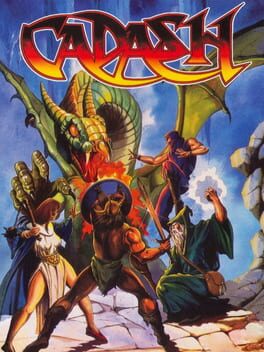Two design philosophies were paramount in the late-80's and early-90's: Arcade-style games and Adventure games. The differences mainly speak for themselves: Games were either short, linear action experiences, or lengthy, narrative-driven journeys. Some overlap occurred, but usually by way of 1 genre being partially supported by elements from the other, or through synthesis to create something new that bridges a gap ala Zelda. But physical injection between the two in a literal sense was sparse, especially with respect to their platforms: A console beat-em-up like River City Ransom could have RPG components, but at best, an arcade beat-em-up is giving you a one-time shop between levels.
Enter Cadash: An co-op action game for arcades framed as a full-on RPG. There's NPC's to talk to, shops to buy equipment and items from, experience to gain from enemies, and all the works. It's like one-parts Metroidvania mixed with Wonder Boy III. I imagine it works really well with a full 4P group where you're all figuratively 'role-playing' a campaign, but it sorely lacks as a 1P experience.
The core of Cadash's problem is that it's too literal of an arcade/RPG mashup, leading to a game that can't fully embrace the strengths of either genre. In respect to the arcade format, there's a timer, so you can't grind FOREVER. The RPG systems are as basic as it gets, without nuance to how you express yourself through loadouts or playstyle. The action and combat scenarios are hardly more interesting than a launch window NES game. The imposed timer means that the game has to be optimized around removing any possible dead-ends or misdirection - thus, the world HAS to be overtly linear. All of its systems are at odds with each other and create an experience where the sum IS greater than the parts, but fails to deliver any one enriching strength. And the bosses suck! It's a bona-fide product of its time from start to finish.
I think the home ports, ironically, made the experience worse. Removing the timer makes it all the more obvious how straightforward Cadash's world is. And with limited continues in place, you gotta restart from level 1 and world 1 on every attempt - a system that works fine for arcade games optimized around repetition and self-growth, but not for an RPG where the appeal lies in quantifiable player development. The Genesis version also removes two of the playable classes and the intro cutscene to fit a 512K cartridge size - in 1992 of all years, when most anything with a non-shovelware budget was given a megabyte or more. Even the PC-Engine Hu-card from a year prior had those features.
Cadash is neat in retrospect and somewhat of a cult classic, but doesn't do anything individual unless you're fascinated by a prospect of a literal arcade RPG.
Enter Cadash: An co-op action game for arcades framed as a full-on RPG. There's NPC's to talk to, shops to buy equipment and items from, experience to gain from enemies, and all the works. It's like one-parts Metroidvania mixed with Wonder Boy III. I imagine it works really well with a full 4P group where you're all figuratively 'role-playing' a campaign, but it sorely lacks as a 1P experience.
The core of Cadash's problem is that it's too literal of an arcade/RPG mashup, leading to a game that can't fully embrace the strengths of either genre. In respect to the arcade format, there's a timer, so you can't grind FOREVER. The RPG systems are as basic as it gets, without nuance to how you express yourself through loadouts or playstyle. The action and combat scenarios are hardly more interesting than a launch window NES game. The imposed timer means that the game has to be optimized around removing any possible dead-ends or misdirection - thus, the world HAS to be overtly linear. All of its systems are at odds with each other and create an experience where the sum IS greater than the parts, but fails to deliver any one enriching strength. And the bosses suck! It's a bona-fide product of its time from start to finish.
I think the home ports, ironically, made the experience worse. Removing the timer makes it all the more obvious how straightforward Cadash's world is. And with limited continues in place, you gotta restart from level 1 and world 1 on every attempt - a system that works fine for arcade games optimized around repetition and self-growth, but not for an RPG where the appeal lies in quantifiable player development. The Genesis version also removes two of the playable classes and the intro cutscene to fit a 512K cartridge size - in 1992 of all years, when most anything with a non-shovelware budget was given a megabyte or more. Even the PC-Engine Hu-card from a year prior had those features.
Cadash is neat in retrospect and somewhat of a cult classic, but doesn't do anything individual unless you're fascinated by a prospect of a literal arcade RPG.
